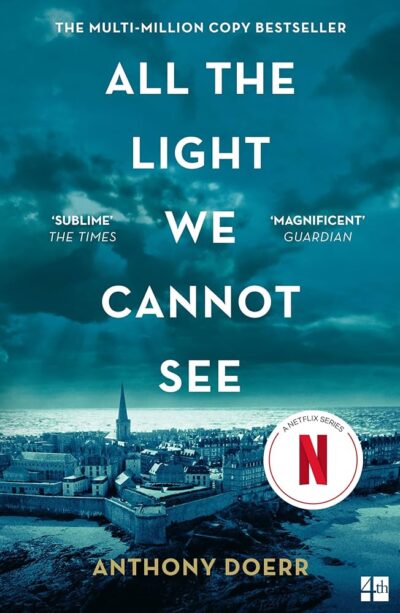615 Results with the "Historical Fiction" genre
Adventure Fiction (1164)
Biography (435)
Business & Finance (1)
Children's Literature (124)
Comics (6)
Culture (51)
Drama (123)
Dystopian (29)
Fable (86)
Fantasy (1132)
Fantasy (203)
Fiction (1010)
Finance (1)
Gothic Fiction (12)
History (122)
Horror (56)
Lifestyle (36)
Literary (404)
Literary Fiction (207)
Memoir (113)
Mystery (422)
Non-fiction (87)
Novel (549)
Paranormal Fiction (96)
Philosophical (182)
Philosophy (45)
Poetry (249)
Political Fiction (14)
Politics (42)
Practical (32)
Psychological (4)
Psychological Thriller (108)
Relationship (6)
Romance Novel (716)
Romantic Melodrama (14)
Satire (91)
Science (46)
Science Fiction (345)
Self-help (68)
Society (65)
Society (2)
Spiritual Growth (1)
story (2)
Thriller (704)
True Crime (56)
view (11)
Women's Fiction (2)
Young Adult (233)
-
Chapter
Mandatory Surrender
 The chapter "Mandatory Surrender" opens with Marie-Laure urging her father to read a notice requiring all citizens to surrender their radios to the authorities by noon the next day. Failure to comply would result in arrest as a saboteur. This directive stirs anxiety in Marie-Laure, as her household contains numerous radios, including those in her grandfather’s room and Etienne’s study. The family begins the painful process of gathering and boxing up the devices, with Marie-Laure listening as each one…
The chapter "Mandatory Surrender" opens with Marie-Laure urging her father to read a notice requiring all citizens to surrender their radios to the authorities by noon the next day. Failure to comply would result in arrest as a saboteur. This directive stirs anxiety in Marie-Laure, as her household contains numerous radios, including those in her grandfather’s room and Etienne’s study. The family begins the painful process of gathering and boxing up the devices, with Marie-Laure listening as each one…-
392.9 K • Ongoing
-
-
Chapter
Making the Radio
 In the chapter "Making the Radio," Werner meticulously assembles a makeshift radio amidst the ruins of a war-torn city. Using salvaged materials like wire, a pipe, and a diode, he constructs a tuning coil and antenna, working under the dim light of a fading flashlight. The oppressive atmosphere is underscored by distant mortar explosions and the groaning of the damaged hotel above them. Despite the precarious surroundings, Werner remains focused, methodically completing the circuit with the help of…
In the chapter "Making the Radio," Werner meticulously assembles a makeshift radio amidst the ruins of a war-torn city. Using salvaged materials like wire, a pipe, and a diode, he constructs a tuning coil and antenna, working under the dim light of a fading flashlight. The oppressive atmosphere is underscored by distant mortar explosions and the groaning of the damaged hotel above them. Despite the precarious surroundings, Werner remains focused, methodically completing the circuit with the help of…-
392.9 K • Ongoing
-
-
Chapter
Making Socks
 The chapter opens with Werner waking in the middle of the night to find his younger sister, Jutta, beside his cot, engrossed in a shortwave radio and a drawing of an imagined city. Her unruly hair stands out in the dim light, adding to her intense presence. Jutta questions the purpose of the sock-making tasks assigned in her Young Girls League, to which Werner dismissively replies that the Reich needs socks for soldiers. Their conversation is interrupted by the cries of a younger boy downstairs,…
The chapter opens with Werner waking in the middle of the night to find his younger sister, Jutta, beside his cot, engrossed in a shortwave radio and a drawing of an imagined city. Her unruly hair stands out in the dim light, adding to her intense presence. Jutta questions the purpose of the sock-making tasks assigned in her Young Girls League, to which Werner dismissively replies that the Reich needs socks for soldiers. Their conversation is interrupted by the cries of a younger boy downstairs,…-
392.9 K • Ongoing
-
-
Chapter
Madame Manec
 Marie-Laure and her father arrive at the home of Madame Manec, an old family friend, who is initially astonished to see them. The warmth and efficiency of Madame Manec’s welcome contrasts sharply with the hardships of their journey. She immediately tends to Marie-Laure’s needs, offering her water, a warm towel, and a comforting presence. The kitchen, filled with the aromas of herbs and cooking food, becomes a sanctuary, highlighting the stark difference between the chaos outside and the safety…
Marie-Laure and her father arrive at the home of Madame Manec, an old family friend, who is initially astonished to see them. The warmth and efficiency of Madame Manec’s welcome contrasts sharply with the hardships of their journey. She immediately tends to Marie-Laure’s needs, offering her water, a warm towel, and a comforting presence. The kitchen, filled with the aromas of herbs and cooking food, becomes a sanctuary, highlighting the stark difference between the chaos outside and the safety…-
392.9 K • Ongoing
-
-
Chapter
Loudenvielle
 The chapter opens with Sergeant Major von Rumpel arriving at a French police station under the glow of a platinum moon. A burglar has been apprehended with a cache of gems stolen from a chalet linked to Paris’s Natural History Museum. Von Rumpel, weakened by illness, observes the police captain’s meticulous demeanor as he waits. The scene is tense, with von Rumpel’s physical frailty contrasting with his determined presence. The arrival of a bloodied prisoner in a beige suit hints at the darker…
The chapter opens with Sergeant Major von Rumpel arriving at a French police station under the glow of a platinum moon. A burglar has been apprehended with a cache of gems stolen from a chalet linked to Paris’s Natural History Museum. Von Rumpel, weakened by illness, observes the police captain’s meticulous demeanor as he waits. The scene is tense, with von Rumpel’s physical frailty contrasting with his determined presence. The arrival of a bloodied prisoner in a beige suit hints at the darker…-
392.9 K • Ongoing
-
-
Story
Long Island
 Long Island is a 2024 novel by Colm Tóibín, which serves as a continuation of his critically acclaimed novel Brooklyn. The story follows the life of Eilis Lacey, now in her 40s, living on Long Island with her husband Tony Fiorello and their two teenage children. Despite her years in America, Eilis has remained deeply connected to her Irish roots and has never returned…
Long Island is a 2024 novel by Colm Tóibín, which serves as a continuation of his critically acclaimed novel Brooklyn. The story follows the life of Eilis Lacey, now in her 40s, living on Long Island with her husband Tony Fiorello and their two teenage children. Despite her years in America, Eilis has remained deeply connected to her Irish roots and has never returned…-
2.3 K • Apr 23, '25
-
2.2 K • Apr 23, '25
-
2.2 K • Apr 23, '25
-
-
Chapter
Little House
 The chapter "Little House" depicts Marie-Laure's confined existence under her uncle Etienne's protection during wartime. Haunted by nightmares of a menacing German officer, she feels relief at being barred from going outside, though their food supplies dwindle to nearly nothing. Etienne braves the outside world to fetch bread, returning each time visibly shaken. Marie-Laure grapples with persistent interrogations about her father's mysterious activities, recalling how authorities questioned her about his…
The chapter "Little House" depicts Marie-Laure's confined existence under her uncle Etienne's protection during wartime. Haunted by nightmares of a menacing German officer, she feels relief at being barred from going outside, though their food supplies dwindle to nearly nothing. Etienne braves the outside world to fetch bread, returning each time visibly shaken. Marie-Laure grapples with persistent interrogations about her father's mysterious activities, recalling how authorities questioned her about his…-
392.9 K • Ongoing
-
-
Chapter
Light
 The chapter follows Marie-Laure, a blind girl, as she gradually masters navigating her neighborhood using a tactile model and her heightened senses. After months of failed attempts, she begins to recognize the correlation between the miniature model in her kitchen and the real-world streets of Paris. By memorizing landmarks like benches, lampposts, and storm drains, she gains confidence in guiding her father home. One snowy day, she successfully orients herself near the Seine, relying on sounds and…
The chapter follows Marie-Laure, a blind girl, as she gradually masters navigating her neighborhood using a tactile model and her heightened senses. After months of failed attempts, she begins to recognize the correlation between the miniature model in her kitchen and the real-world streets of Paris. By memorizing landmarks like benches, lampposts, and storm drains, she gains confidence in guiding her father home. One snowy day, she successfully orients herself near the Seine, relying on sounds and…-
392.9 K • Ongoing
-
-
Chapter
Light
 The chapter opens with Werner, a young German soldier, being captured by French resistance fighters near Saint-Malo. Initially mistaken for a spy due to his accent and uniform, he is handed over to American forces and processed in a makeshift disarmament center. Despite his youth, Werner is treated with suspicion, and his inquiries about a girl—presumably Marie-Laure—are dismissed. He is placed in a courtyard with other German prisoners, including a deserter in women’s clothing, and struggles with…
The chapter opens with Werner, a young German soldier, being captured by French resistance fighters near Saint-Malo. Initially mistaken for a spy due to his accent and uniform, he is handed over to American forces and processed in a makeshift disarmament center. Despite his youth, Werner is treated with suspicion, and his inquiries about a girl—presumably Marie-Laure—are dismissed. He is placed in a courtyard with other German prisoners, including a deserter in women’s clothing, and struggles with…-
392.9 K • Ongoing
-
-
 Lessons in Chemistry by Bonnie Garmus is a witty and heartwarming novel that follows Elizabeth Zott, an unconventional and brilliant chemist in the 1960s, as she navigates sexism in the male-dominated world of science, ultimately becoming an unlikely star of a popular cooking show, where she uses her platform to challenge societal norms.
Lessons in Chemistry by Bonnie Garmus is a witty and heartwarming novel that follows Elizabeth Zott, an unconventional and brilliant chemist in the 1960s, as she navigates sexism in the male-dominated world of science, ultimately becoming an unlikely star of a popular cooking show, where she uses her platform to challenge societal norms.-
4.2 K • Jan 8, '25
-
4.9 K • Jan 8, '25
-
4.5 K • Jan 8, '25
-
- Previous 1 … 22 23 24 … 62 Next
